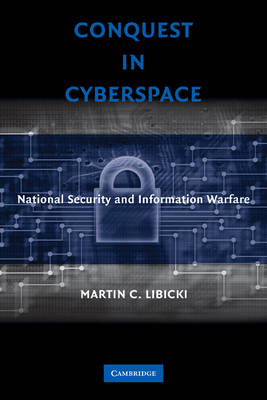
Conquest in Cyberspace
Cambridge University Press (Verlag)
978-0-521-69214-4 (ISBN)
With billions of computers in existence, cyberspace, 'the virtual world created when they are connected,' is said to be the new medium of power. Computer hackers operating from anywhere can enter cyberspace and take control of other people's computers, stealing their information, corrupting their workings, and shutting them down. Modern societies and militaries, both pervaded by computers, are supposedly at risk. As Conquest in Cyberspace explains, however, information systems and information itself are too easily conflated, and persistent mastery over the former is difficult to achieve. The author also investigates how far 'friendly conquest' in cyberspace extends, such as the power to persuade users to adopt new points of view. He discusses the role of public policy in managing cyberspace conquests and shows how the Internet is becoming more ubiquitous and complex, such as in the use of artificial intelligence.
Martin C. Libicki, a Senior Policy Analyst at the RAND Corporation since 1998, works on the relationship between information technology and national security. He has written numerous monographs on the subject, notably What is Information Warfare, The Mesh and the Net: Speculations on Armed Conflict in a Time of Free Silicon, and Who Runs What in the Global Information Grid. Dr Libicki is also the editor of the RAND Textbook, New Challenges, New Tools for Defense Decisionmaking. His most recent assignments at RAND have been to develop a post-9/11 information technology strategy for the U.S. Department of Justice and DARPA's Terrorist Information Awareness program, conduct an information security analysis for the FBI, investigate targeting strategies of al Queda, and assess CIA's R&D venture, In-Q-Tel. He previously taught at the National Defense University. Dr Libicki received his Ph.D. from the University of California at Berkeley in 1978.
1. Introduction; 2. Hostile conquest as information warfare; 3. Information warfare as noise; 4. Information warfare against defense systems; 5. Information warfare against command and control; 6. Friendly conquest in cyberspace; 7. Friendly conquest using global systems; 8. Retail conquest in cyberspace; 9. From intimacy, vulnerability; 10. Talking conquest in cyberspace; 11. Managing conquest in cyberspace; Appendix. Why cyberspace is likely to gain consequence.
| Erscheint lt. Verlag | 16.4.2007 |
|---|---|
| Zusatzinfo | Worked examples or Exercises |
| Verlagsort | Cambridge |
| Sprache | englisch |
| Maße | 155 x 230 mm |
| Gewicht | 500 g |
| Themenwelt | Informatik ► Netzwerke ► Sicherheit / Firewall |
| Informatik ► Theorie / Studium ► Kryptologie | |
| Sozialwissenschaften ► Politik / Verwaltung | |
| ISBN-10 | 0-521-69214-8 / 0521692148 |
| ISBN-13 | 978-0-521-69214-4 / 9780521692144 |
| Zustand | Neuware |
| Haben Sie eine Frage zum Produkt? |
aus dem Bereich


